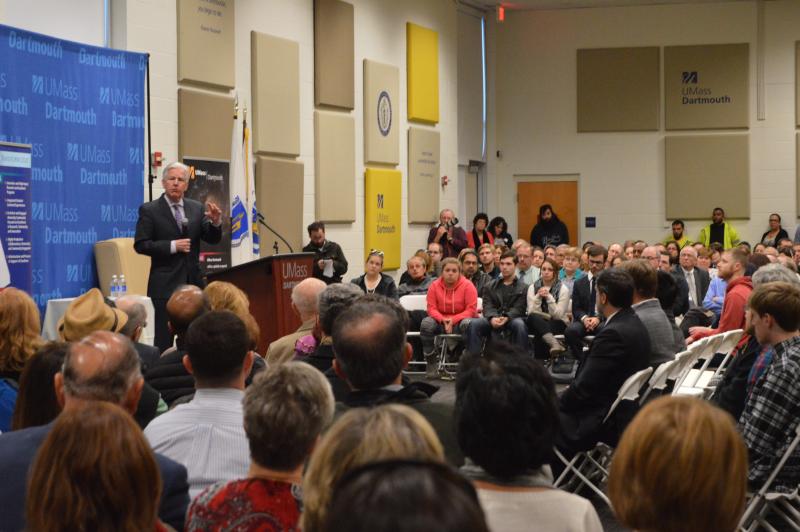UMass President Meehan addresses the future of Umass Dartmouth
Between searching for a new leader and adjusting campus policy, UMass Dartmouth will be seeing major changes in the weeks ahead.
Mass President Marty Meehan visited UMass Dartmouth on Dec. 9 to address a room packed full of faculty members and students regarding the transition in leadership and the future of the campus. Meehan spent about an hour fielding questions and taking suggestions from the audience.
“I have worked with Chancellor Grossman for three and a half years. I think that she has worked her heart out to try to make this campus better,” said Meehan.
Last week, UMass Dartmouth Chancellor Divina Grossman announced that she will step down from her position on Dec. 24. While she did not go into the specifics of her decision, she wrote in a statement that she respects and accepts “President Meehan’s prerogative in building his leadership team.”
The decision came after an article published in The Boston Globe last month sourced two unnamed officials who said Meehan would be relinquishing Grossman from her role at the end of the academic year. Meehan briefly mentioned the article on Wednesday, calling it hurtful to “anyone associated” with the UMass system.
“If I had evidence or thought that anybody in the president’s office had anything to do with that, I would fire them,” said Meehan. “But let’s move on.”
The bulk of his talk dealt with moving the campus forward. He said an interim chancellor will be appointed in the next few weeks before launching into a national search to find potential candidates.
“I don’t think that this campus can afford a period of time in limbo. We need someone who can make decisions now,” he said.
Meehan said the ideal candidate would have prior experience with running a university, particularly one that requires more funding, and will engage the campus community to build a new direction for the school. He said this might require updating strategic plans of the past such as at the Transform2020 initiative, which aimed to garner national attention for the university for being a research university south of Boston.
Members of the faculty had questions for Meehan regarding the future of campus policy. Alan Hirshfeld, director of the UMass Dartmouth Observatory, asked about how funding – both state and private – will work in the future. Meehan said increased enrollment will result in more revenue, which can then be invested back into the university.
“When we think about a new leader for this campus, it might not be a bad idea to get somebody that has had some experience in an institution that needs to generate revenue,” said Meehan. “We can’t afford to just rely on the state.”
He said the community will need to think about how the university can attract students. Audience members suggested the campus should consider offering more for veterans returning to college, a child care center, streamlining the process for creating a new degree program and finding a way to better market master’s degree programs.
Audience members also questioned how the president’s office intends to retain faculty.
“The campus has an established record of racial hostility that has been recognized by both the outgoing chancellor and the one before her. We have zero African-American women on the faculty here, and two of us are African,” said Viviane Saleh-Hanna, chair of the Crime and Justice Studies department.
Saleh-Hanna requested that the incoming interim chancellor have an established record of knowing how to tackle those issues.
Meehan concluded his hour-long hearing by saying the university’s future is more important than any individual, himself included.
“We need to embrace what we have and make it better,” Meehan said.
Doug Roscoe, president of Faculty Senate, said Meehan addressed the issues that were on the faculty’s minds.
“I like that [Meehan’s] ready to look where we need to go to raise the profile of the campus,” said Roscoe.
He said the search for potential candidates will be difficult because the role of chancellor requires a diverse skill set.
“We need to have someone who understand politics, particularly for a state university, but also understands academic politics; has vision, but also knows how to manage; and who can work with the university internally, but also has that ability to cultivate relationships with potential donors,” said Roscoe. “It’s rare to find someone who can do all that.”














